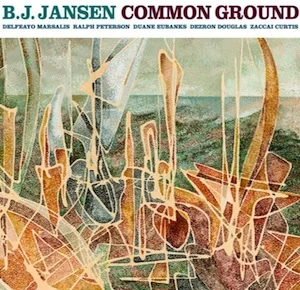Label/Year: Fresh Sound New Talent Records, 2017
Lineup - Jason Rigby: tenor and soprano saxophone; Cameron Brown: double bass; Gerald Cleaver: drums.
// this review was originally published on LondonJazz News on Apr 28 //
American saxophonist/composer Jason Rigby has this spontaneous capacity to adapt his way of playing to different styles and moods. He is a shape-shifter whose musical approach is a synonym of consistency regardless if he’s playing in small groups such as the quartets of Mike Baggetta and Mark Guiliana, or large ensembles like the Alan Ferber Big Band.
His work as a leader has been released on the Fresh Sound label and consists of Translucent Space (2006), Sage (2008), and this one, where we can find Rigby spearheading a trio of habitual partners: veteran bassist Cameron Brown and in-demand drummer Gerald Cleaver. The strong rapport built over the years is transferred to the recording, allowing us to indulge in tight trio maneuvers, solo stretches, dynamic interactions, and stirring improvisations.
The album opener, "Dive Bar", is an electrifying sax-drums duet of enormous force and stamina that pushes us to the particular worlds of Coltrane and David S.Ware. Playful and incisive in his phrasing, Rigby, who composed the tune, finds the required ebullience in Cleaver’s inventive drumming and methodical Afro rhythms.
Inspired by the literary work of Oscar Wilde, "Dorian Gray" is another original that kicks in with an odd-metered bass groove linked to a steady pulse. The solid ground consolidates Rigby’s adventurous verbalizations and figures of speech.
His brittle tenor makes a distinct impact on Rogers & Hart’s "You Are Too Beautiful", a sparkling ballad configured with well-resolved bop phrases and delivered with unexpected inner energy. He also digs Embraceable You, another jazz standard. However, this time he does it alone, employing lots of zig-zags and making the tune almost unrecognizable.
Interesting renditions of George Schuller’s "Newtoon", which takes an experimental path due to the trio’s unrestricted approach, and Herbie Hancock’s "Speak Like a Child", shaped by the agile cascades of notes poured out of Rigby’s soprano sax, are also part of the roster.
"Dewey", composed by the bandleader as a tribute to the late saxophonist Dewey Redman, closes the album in the best avant-garde jazz tradition. During the improvisational segment, Rigby throws in exciting rhythmic ideas, and insurgent swoops and slides, but he also caresses distinguishable melodies to balance and regulate the flow.
One is a formidable creation by a rhythmically advanced, intensely focused trio whose expansions and contractions will suit the tastes of modern creative jazz aficionados. Rigby leads with resolve, evincing an outgoing posture, compositional bravura, and a laudable flair for exploration.
Grade A-
Favorite Tracks:
01 – Dive Bar ► 05 – Speak Like a Child ► 08 – Dewey








































